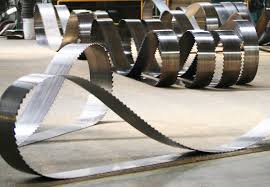Career
5 Essential Skills for a Fabric Sourcing Job Description
Fabric Sourcing is an essential part of the fashion industry. It’s crucial to understand how fabrics are sourced so that you can make informed decisions about the best material for your line. Typically, a textile-sourcing merchandiser has a textile/clothing technology degree or a related subject. You can also gain experience in the field through internships at fashion houses or fabric manufacturers.
Negotiation Skills
The fabric sourcing department at an apparel company will negotiate with suppliers to secure the best prices and lead times for fabric. This involves determining the type of fabric needed for a garment and then finding the right supplier to provide it. It also involves working with the supplier to establish a production schedule and delivery time frame. They may also manage the sourcing process and inventory tracking. When interviewing for a fabric sourcing job description, it is essential to have strong negotiation skills. This is because it can be challenging to find a fabric supplier who will meet the price and quality requirements of the clothing company. In addition, the fabric sourcing manager will often work with international suppliers and manufacturers. When discussing your negotiation skills, it is crucial to highlight examples of how you have negotiated deals and contracts. This can help you stand out from other applicants and get the job. It would be best if you also were prepared to answer questions about how you handle difficult situations with vendors.
Communication Skills
Fabrics are one of the most essential components in any apparel manufacturing business. They are an important part of the production process and can make or break a garment’s quality and finish. That is why it is vital to know how to find the best fabrics at the right price to meet your company’s-company’s goals. The fabric sourcing process involves sending specifications to suppliers and requesting sample swatches. Once the samples are received, you must test them for wash and wear performance. It is crucial to do this before ordering fabric in bulk. If the material is different than expected, you must return it for a refund. The fabric sourcing manager will oversee a dynamic schedule of clients contracted for fabric and trim sourcing services in our fashion development and production company. The ideal candidate will be able to provide excellent customer service while providing strong technical support for various garment styles and product types across all price points. Strong leadership and relationship management skills are a must.
Organizational Skills
Fabric sourcing managers must be able to organize a large volume of information and deadlines to meet the company’scompany’s purchasing objectives. This includes preparing and submitting detailed quotes to vendors, assessing supplier pricing and quality, and maintaining accurate inventory data. They also need to ensure that all aspects of the sourcing process are coordinated and monitored, from fabric development through production, while meeting all established deadlines. In addition, they must be prepared to travel and work with international suppliers, as many of these jobs are located overseas near manufacturing sources. They must be able to communicate effectively with overseas partners daily regarding fabric submissions, artwork approval, and the status of the fabric production schedule. Fabric sourcing managers must be well-versed in working with various fabrics and woven materials, including knitted and jersey fabrics. They need to be able to analyze a range of fabrics and determine which ones will best suit the design concept for the upcoming season. This requires highly technical expertise in woven and jersey fabrics and an understanding of fashion trends.
Customer Service Skills
Fabric sourcing professionals are often responsible for addressing a range of customer issues. Responding quickly, accurately, and professionally is critical to keeping customers happy and satisfied. Customer service skills include communicating clearly and concisely in written and spoken words and being willing to go above and beyond to resolve an issue. It may seem obvious, but treating each customer respectfully and with dignity is also crucial for a fabric-sourcing professional. This includes listening to each customer’s concerns, offering appropriate advice and recommendations, and making them feel valued as a customer. Ending each conversation with confirmed customer satisfaction (or as close as possible) is also essential. It is not uncommon for the most memorable customer support stories to feature an employee who was extra and went above and beyond to help their customer. It’s these employees who stand out and are worth emulating. It can be challenging to develop these customer service skills in some people, but the most effective way is through training and rewarding excellent performance.
Time Management Skills
Fabric sourcing is a very time-consuming process. It requires a lot of research and negotiation to ensure that the company gets quality fabrics at the best prices. This role also involves traveling to various countries to attend trade shows and meet with suppliers. It is, therefore, essential to have good time management skills. The fabric sourcing manager will provide strong leadership and direction for all sourcing functions. Responsible for developing fabric strategies that align with product development/production goals. Ensures on-time shipment of quality products to market. Organizes all sourcing activities, including mill visits, testing and pricing, sample-to-bulk sourcing, risk assessment, and supplier development. Leads finish/fabric meetings with clients and design firms to execute final product specifications. Maintains strong relationships with vendors/mills to develop woven and knit fabrics. Responsible for identifying potential mills and determining if they have the technical capability to perform to our standards. Identifies & negotiates fabric pricing, delivery terms, and supplier contract negotiations for all programs. Ensures all fabric and garment costing is correct and up to date.
Related Posts












